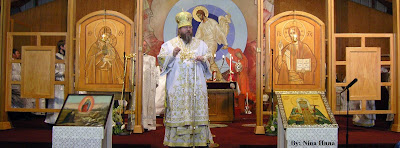The Chicago native elected to the helm of the Orthodox Church in America resigned last weekend, saying in a letter that he has "neither the personality nor the temperament" to lead the church.
Metropolitan Jonah submitted his resignation during a conference call on Saturday, July 7, with other bishops of the church. In his letter of resignation, he said he was leaving the post in response to the unanimous request of the bishops.
"I had come to the realization long ago that I have neither the personality nor the temperament for the position of primate, a position I never sought nor desired," he wrote in a letter of resignation.
He should have come to the realization "long ago," as he said he did, but if so, why did it take him so long to step down. It was over a year ago that the mounting tensions led the Synod of Bishops to ask Jonah to ask for a leave of absence, for his own mental and spiritual well-being. The decision came as a result of ongoing struggles between Jonah and the Synod of Bishops, the Sexual Misconduct Policy Advisory Committee, and members of the highest echelons of the church and because of Jonah's attempts to force a move of the administration of the church from its traditional home in New York to Washington and suspicious relationships he maintained with the church in Russia that many believed hinted toward an effort to give up OCA autocephaly. All of that was last spring, and even after his "retreat," Jonah came back as contentious as ever.
So it really isn't shocking in the least that the bishops of the OCA would "unanimously" request that he step down. The only real surprise is that it took so long to do it. Jonah was chosen as the Metropolitan in one of the darkest times for the OCA and made his name by challenging prevailing notions of tyrannical authority that had lead to the corruption and crisis under the previous metropolitan. I remember his selection in 2008 and listened to his speeches as often as I could lay my hands on them. As an interested observer, I had hope for the direction of the OCA, but, having watched history unfold, I can only ask myself, what ever happened to this guy?
On a broader level our whole life in this Church together is a life of 'synergy', a life of voluntary cooperation, a life of obedience to Jesus Christ and to the Gospel. If it is not about obedience to Jesus Christ and the Gospel (then) what are we doing here? What are we doing here?
The Gospel has to be first and foremost above every other consideration. It is the canon by which we measure ourselves.
So when we look at our ecclesiology, when we look to see what the Church is and what the Church can be -- because it is always in that process of becoming - it is always in that process of entering into that divine synergy which is nothing else than the very process of our deification together as one body with one spirit, with one heart, with one mind. And it's a mutual decision to cut off our own will, to cut off our own selfishness, to cut off our own ideas, to enter into that living 'synergy' which is communion; otherwise, our Eucharist is a sham and we are alienated from Christ.
If we are not at peace with one another -- now that doesn't mean that we cannot, you know, work out our disagreements, God knows as Orthodox we love to fight, right? But we need to work it out so that we can enter into that living experience of communion in cooperation and mutual obedience and mutual submission in love and mutual respect.

